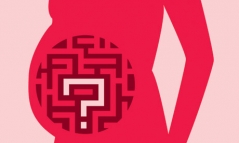Foetus or child? Language and attitudes toward abortion
 Illustration: Gary KempstonDue to moral, religious and cultural sensibilities, the topic of abortion still gives rise to controversy in many countries. In this post, I will discuss our research showing how language used in abortion discourse can affect people’s attitudes by changing their attributions of humanity to unborn (Mikołajczak & Bilewicz, 2015).
Illustration: Gary KempstonDue to moral, religious and cultural sensibilities, the topic of abortion still gives rise to controversy in many countries. In this post, I will discuss our research showing how language used in abortion discourse can affect people’s attitudes by changing their attributions of humanity to unborn (Mikołajczak & Bilewicz, 2015).
The news about the British ‘royal pregnancy’ was stirring up the media worldwide from the day it was officially announced to the very date of delivery. A couple of days later, in an article entitled ‘When is a royal baby a foetus?’, Owen Strachan (2013), a professor of theology and history at Boyce College, commented on the media coverage which almost unanimously used the phrase ‘royal baby’ throughout this period. What Strachan found most unnerving was that media purportedly neutral on the issue of abortion were, in his opinion, making in this case a language choice coding a pro-life stance.
Pro-life vs. pro-choice language
Strachan’s commentary underscores the polarization that occurs in public debate between pro-choice and pro-life rhetoric is often reflected in the language used to describe pre-natal life. Examples of such polarized categories are numerous: a woman may be described as either “pregnant” or “in the family way”, may undergo an “abortion procedure” or commit “infanticide”; she may be given the “right to make a decision concerning her body” or “spread lethal culture” by “murdering the unborn”. On closer inspection, however, the most prominent distinction concerns the object of abortion itself, namely the “foetus” or the “(unborn) child” (e.g. Graff, 2008; Joseph, 2009; Tan, 2004).
“Foetus” vs. “child”
In our studies we wanted to verify whether particular terms used to describe pre- natal life shape people’s perceptions and abortion-related attitudes. To test this link we presented participants with a survey that was allegedly testing their knowledge about the “foetus’s” or the “child’s” development (depending on the condition they were randomly assigned to). Results indicated that the manipulated term affected abortion-related attitudes such that those presented with the term foetus were more allowing of the abortion for non- medical or non-legal reasons than those presented with the term child.
In two follow-up studies we asked participants to take the perspective of a psychologist and decide to what extent particular traits can be ascribed to a foetus [or a child] by the end of the first trimester of pregnancy. Results revealed that a child as compared to a foetus was attributed with more human traits and participants presented with the term child were more critical of all abortion-legalizing policies to the extent that they attributed more human traits to a child (as compared to participants presented with the term foetus).
Our studies highlight the role of language in altering abortion attitudes. Indeed, not only the arguments used in the public debate on abortion but also the specific words used in such statements may alter abortion-related attitudes or decisions concerning the pregnant woman’s health. This relationship may be partially explained by different levels of humanness attributed to the unborn, depending on the term used. Our studies indicate that the foetus, as compared to the child, is perceived as lacking human traits (Haslam, 2006). Such a mechanism may be highly functional in coping with the distress resulting from pregnancy loss: greater emotional distancing may enable pregnant women to make deliberate decisions also when faced with a dilemma on whether or not to perform an abortion.
Moral, legal and medical implications
Our findings have several practical implications. Depending on the meaning these terms carry, people may unwittingly adopt and alter their attitudes related to abortion and rights of the unborn upon encountering them in the public discourse. The same might result from the interchangeability of such terms in legislation that passes unnoticed (cf. Danet, 1980). The results also have crucial implications for moral concern among the medical practitioners (cf. Vaes & Muratore, 2013). Terms used can affect patient care, particularly decisions concerning the communication with and treatment of pregnant women. Greater humanness attributed to the unborn as a result of the used term might lead to granting it the status of an independent patient. Consequently, this might lead to an objectification of women for the sake of the welfare of the unborn, for example by forcing them to undergo caesarean section.
Although our studies focused specifically on abortion-related attitudes, our findings might serve as a starting point for the broader discussion of the role of language and perceived humanness in other ethically controversial issues, such as attitudes toward stem cell research, in vitro fertilization, persons in persistent vegetative states, or euthanasia.
References
Graff, A. (2008). Świat bez kobiet. Płeć w polskim życiu publicznym [A world without women. Gender in Polish public life]. Warsaw, Poland: WAB.
Haslam, N. (2006). Dehumanization: An integrative review. Personality and Social Psychology Review, 10, 252–264.
Joseph, R. (2009). Human rights and the unborn child. Leiden, the Netherlands: Martinus Nijhoff Publishers.
Mikołajczak, M. & Bilewicz, M. (2015). Foetus or child? Attributed humanness and attitudes toward abortion. British Journal of Social Psychology, 54, 500-518.
Strachan, O. (2013, July 24). When is a royal baby a fetus? The Atlantic. Retrieved from http://www.theatlantic.com/sexes/archive/2013/07/when-is-a-royal-baby-a-...
Tan, M. L. (2004). Fetal discourses and the politics of the womb. Reproductive Health Matters, 12, 157–166.
Vaes, J., & Muratore, M. (2013). Defensive dehumanization in the medical practice: A cross-sectional study from a health care worker's perspective. British Journal of Social Psychology, 52, 180-190.

